Disability Portrait
Igor Samardzic, Toronto
Project Description & Goals
This project strategically positions disability in public spaces, serving as a catalyst for public education and awareness about the experiences of people with disabilities. The vivid displays similar to an outdoor art gallery will punctuate our societal presence, asserting our visibility and right to space. Igor’s objective is to ensure that accessibility considerations remain at the forefront of public consciousness, enhancing civic engagement, activating public space, and fostering social inclusion.
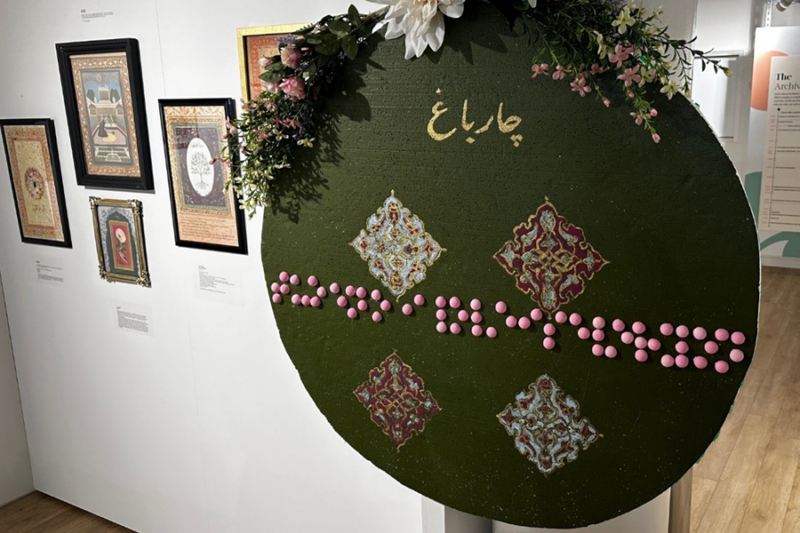 Highlights, Successes, Challenges & Impacts
Highlights, Successes, Challenges & Impacts
This year has been both rewarding and challenging for the Toronto-based changemaker as he worked on the Disability Portrait project. One of the primary challenges was executing a project that was unique and engaging for the disability art community, while also generating enough interest and momentum to follow through. There were setbacks in terms of having an expansive vision that was perhaps too elaborate initially. However, two successful projects emerged: a braille art display that intersected multiple equity dimensions including disability, religion, and gender, and a braille wayfinding sign at Bloor and Sussex Mews. “Additionally, I am working on a short documentary supported by these efforts, which is still in progress, adds Igor.
Completing these projects brought immense joy, particularly in engaging the disability community to create a supportive environment for artists and to showcase art that is often overlooked by society. The challenges taught me valuable lessons about scaling back and focusing on achievable goals.
Reflecting about goals met, the changemaker says that initially, the project aimed to be more expansive with a grand vision. However, upon further reflection and planning, Igor pivoted to create a smaller, more focused project. Ultimately, it did achieve the primary goal of elevating the work of disability and accessibility through art and championing the contributions of these individuals.
The project had a significant impact on both the artists involved and the public who viewed the artworks. They engaged with six disabled artists, gaining insights into their perspectives and lived experiences. The visual pieces created through this collaboration were displayed publicly, allowing people to interact with and gain a deeper understanding of accessibility through art. The artworks highlighted stories and experiences related to disability and accessibility, fostering a different perspective among viewers.
Relevant Data:
- Number of events: 2 (Cloverdale Mall and Bloor and Sussex Mews)
- Planning meetings: 4
- Site visits: 2
- Conversations with artists: Approximately 3-4
I learned that impact does not necessarily need to be grand or large in scale; it can be measured by the depth and quality of the connections you make and the influence you have on individuals. The conversations, relationships, and shared experiences with the artists and community members are the true measure of success. Additionally, I learned that spearheading a unique project can be challenging and may involve doubts from others. Navigating these challenges requires patience, resilience, and a strong belief in the project’s value.
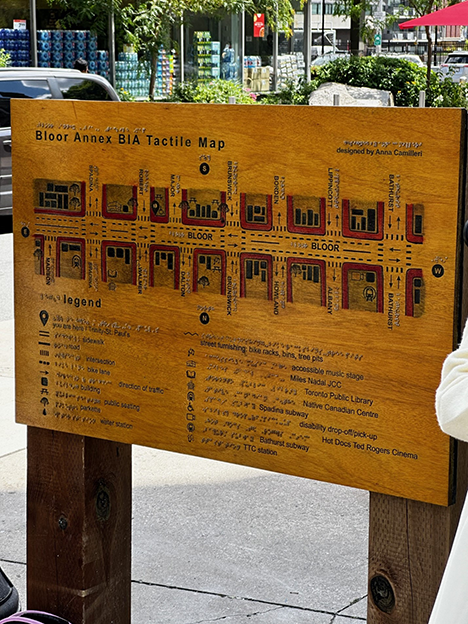
As there is always room for improvement, Igor said he would practice more patience and gratitude for his efforts. “I would manage my expectations better, understanding that capacity building and community work take time. It is essential not to be too hard on oneself or take setbacks personally.” He shares that recognizing the importance of self-compassion and persistence would have made the process smoother”.
The best part of being a changemaker was the experience of working alongside other incredible changemakers. The conversations, relationships, and shared spaces were inspiring and provided much-needed energy and motivation to continue my work. It was reassuring to know that I am not alone in this journey, and the collective effort of all changemakers created a supportive and empowering environment.
About Igor
Igor is a member and co-founder of several nonprofit boards, reflecting his deep commitment to community work. His persistent efforts focus on the creation of a more accessible, equitable and livable city for all.
#socialinclusion #civicengagement #publicspaceactivation #accessiibility
Caring for the Carers
Nicole Sudiacal, Ottawa
Project Description & Goals
Caring for the Carers is a project to support the Filipino migrant community and those within the health/care sector by providing know-your-rights workshops, leadership skills training, and crucial intergenerational conversations.
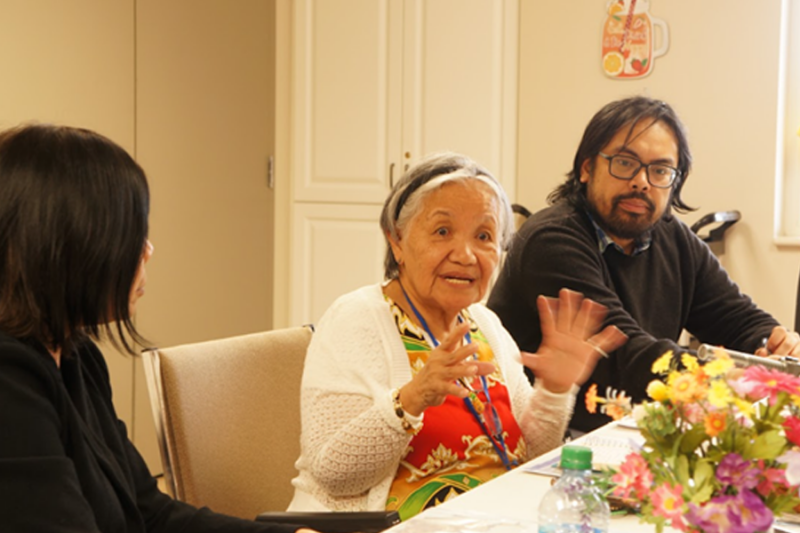 Highlights, Successes, Challenges & Impacts
Highlights, Successes, Challenges & Impacts
The Ottawa-based changemaker mentions that the year’s highlights have been renewing connections with fellow community members and making new connections. The overall goal of the project was to build up the strengths and knowledge of Filipino migrant care workers and empower their lived experience to better understand their rights and fight for a better livelihood.
The major challenges that she faced with executing the project were that Filipino care workers are interested but may not be able to take time off to attend workshops due to being on call, pure exhaustion from their work, family duties, or other last-minute commitments. We had to be creative in connecting with community members.
She overcame this challenge by pivoting the project to focus more on aging community members who have been carers of our families and friends and seeing how we, as younger Filipinos, could Care for the Carers. They made these connections through churches and senior associations.
Another personal challenge was that Nicole found out she was pregnant in early April and had a very difficult first and second trimester. Despite this challenge, she was able to rely on my co-lead, Charlene Herrera, and other Migrante Ottawa volunteers to help take on the lead for the last bit of the project.
The project met its goals as expected. Through sessions with elderly Filipino community members, they gained more knowledge about their experiences as working-class Filipinos and the struggles that they faced as an exploited class. They provided storytelling sessions on Migration Stories, Aging and Legacy, Caretaking and Caregiving, Landmarks past and present, and an Intergenerational Conversation.
Through these sessions, they learned a lot from the wisdom, lessons, and warmth that elderly Filipino community members shared and had the opportunity to connect with younger community members. This broke down isolation barriers by having monthly storytelling sessions, which they hope to continue.
The original goal of focusing on workers’ rights within the Filipino community was challenging to achieve ultimately. Although they could host a few know-your-rights workshops and sessions, the follow-up was difficult due to the abovementioned challenges. However, by pivoting our project, we still achieved our desired outcome of supporting our community.
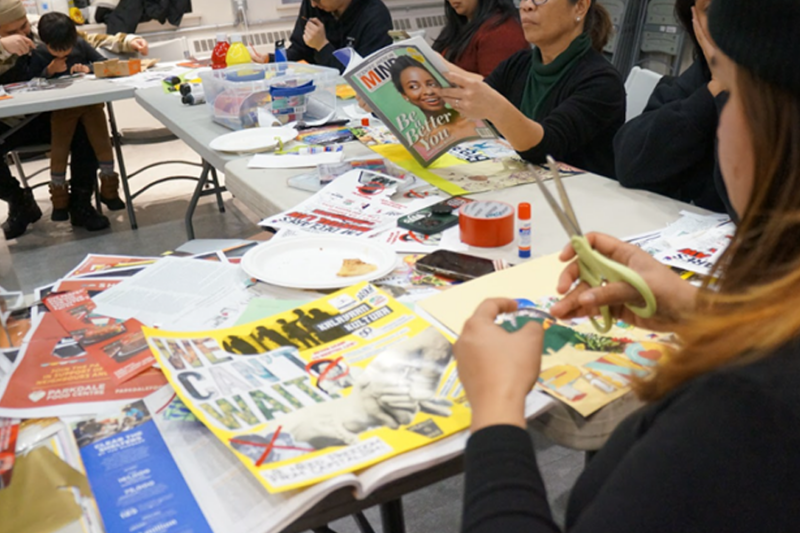 Projects’ Impact
Projects’ Impact
- Overall, the various events and meetings held allowed Nicole to connect broadly with over 100-200 community members.
- 10 group workshops and five one-on-one sessions from June 2024 – July 2024
- Most of the time spent during the project year included:
- Booking rooms and making phone calls to the community
- Emailing and outreach to Filipino community members
- Preparing for each group workshop before, during, and after
- Researching the most up-to-date immigration information labour laws and connecting members with legal services
- Going to print shops to print flyers and posters for community outreach
- Follow-up phone calls with caregivers, elderly community members, and additional volunteers
- Coordination meetings with the Migrante Ottawa organization and volunteers
- Further 1-on-1 meetings to co-lead on the project
- Purchasing materials and items for community art events
- Financial tracking of project cost
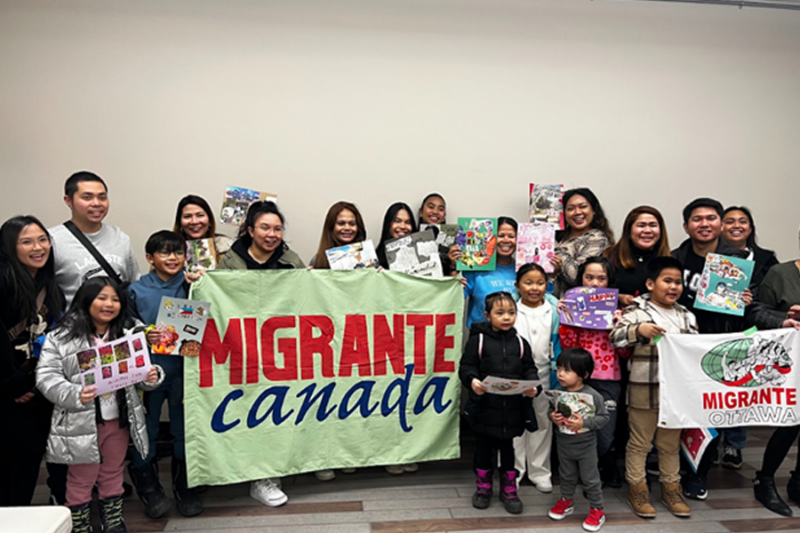 What became apparent during the project was that learning to pivot, assess and move in a different direction can be daunting but ultimately will work out for the better. It also became clear that to organize workers more effectively, the project needs more funds and resources, time and people to create outreach teams. Although they did have volunteers, they found that scheduling ultimately was one of our biggest challenges. “So many of our fellow migrant workers work 2, 3 or 4 jobs to keep their heads above water. Finding time to provide workshops for them in group settings became incredibly difficult. We learned early on that one-on-one sessions would be most useful, but we also found that the services they needed required more in-depth service provision. From our project, we learned there is a gap in services within the city of Ottawa for specific and culturally relevant immigration, housing, familial counselling, and employment services to the Filipino community,” she says.
What became apparent during the project was that learning to pivot, assess and move in a different direction can be daunting but ultimately will work out for the better. It also became clear that to organize workers more effectively, the project needs more funds and resources, time and people to create outreach teams. Although they did have volunteers, they found that scheduling ultimately was one of our biggest challenges. “So many of our fellow migrant workers work 2, 3 or 4 jobs to keep their heads above water. Finding time to provide workshops for them in group settings became incredibly difficult. We learned early on that one-on-one sessions would be most useful, but we also found that the services they needed required more in-depth service provision. From our project, we learned there is a gap in services within the city of Ottawa for specific and culturally relevant immigration, housing, familial counselling, and employment services to the Filipino community,” she says.
“Now that we have conducted this project, it’s become clear that we want to continue expanding the connections and impact we have made. Securing other funding sources besides the Ontario Community Changemakers funding would have been very helpful to us. Being more creative in fundraising efforts would have also been very helpful to us, to become self-sufficient in some way”, shares the changemaker.
The best part of being a changemaker is being able to create a tangible difference in the lives of our communities. Primarily breaking down barriers of isolation, loneliness, and desperation was an immensely important achievement of ours. We collectively learned how to plan, launch and assess our project, and pivot – all learnings and lessons that have supported our personal growth as well.
About Nicole
Nicole Sudiacal is a Filipino community organizer with Migrante Ottawa, a mother, and a constant learner. She is a Conflict Studies & Human Rights graduate who is passionate about equity, migrant and patient rights, and collective community engagement to transform the societies in which we live.
#socialinclusion #civicengagement #immigartion #migrantworkers
BIPOC Environmental Bootcamp
Patricia Wilson, Nogojiwanong/ Peterborough
Project Description & Goals
The original intention of this project was to create a series of skills-building workshops for racialized people interested in learning more about the environment and potentially building careers in this sector. The hope was to partner with an academic institution to create this series as a course where participants could obtain a certificate or micro-credential to boost their resumes and help them find employment in this sector.
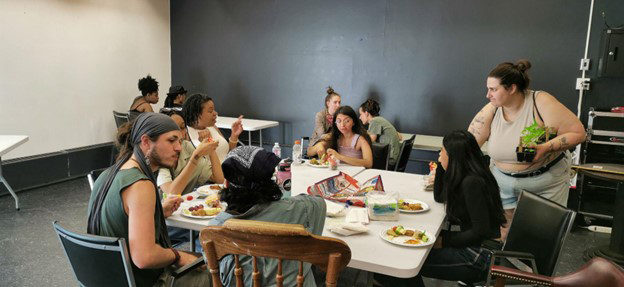
Highlights, Successes, Challenges & Impacts
Throughout the year of the project implementation, the Peterborough-based changemaker spent a lot of time meeting with different academic institutions to try and make this happen. Patricia made connections with Fleming College, which has a nationally known “School of Environment.” The intention was for Fleming to platform this program and issue micro-credentials. One of the barriers to creating this course was making it accessible to racialized individuals. Running a course through the college presented challenges, mainly in making it affordable. For a course to run through the college, it needed to be profitable, which would have cost participants hundreds of dollars. Many behind-the-scenes administrative pieces make it impossible to discount the course. In partnership with Fleming College, a grant application was written to NSERC to try and get funding to help create some online programming and a week-long camp targeting racialized youth. Unfortunately, the funding was not secured. Shortly after, Fleming College cut a significant amount of its programming due to college-wide funding issues stemming from low enrollment, especially with a cap on international students, who are charged almost triple the domestic student fees.
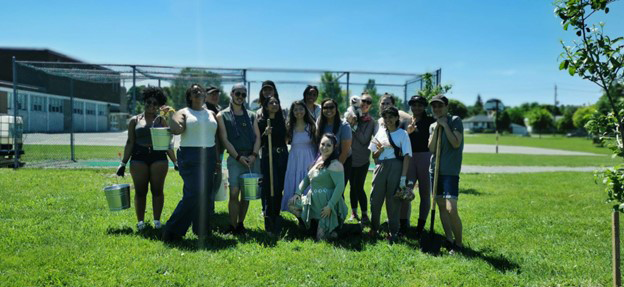
The project had to be reimagined to determine what types of programming could be run and what would attract people. Much time was spent networking, attending conferences, and connecting with youth and the community to see what people sought. Last fall, a retreat was organized and run for BIPOC leaders across Ontario who work within the environmental or outdoor sector. This retreat was the first of its kind and generated much interest online. It was a transformative weekend that engaged 15 BIPOC leaders from across Ontario. Through this weekend, it became clear that there is a massive need for BIPOC leaders working in the environmental and outdoor sectors to have the opportunity to connect, network, and uplift each other in the critical work of diversifying these industries. Several collaborative events, workshops, and opportunities happened throughout the year due to the connections made at this gathering.
While the project did not meet the intended goal of curating a workshop skills-building series for BIPOC individuals that would provide a micro-credential upon completion, it still created opportunities that spoke to the larger goal of bringing environmentally-minded BIPOC folks together and creating community.
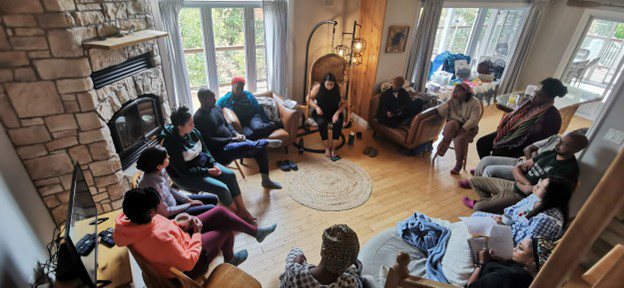 Connections were made with BIPOC leaders doing incredible work across Ontario, creating space for racialized people in the environment and outdoors and building a network for BIPOC leaders to connect. In addition to curating a weekend retreat for BIPOC environmental leaders, a partnership was formed with a local non-profit called Community Race Relations Committee of Peterborough (CRRC) to run a program called Resilient Roots. Resilient Roots is a climate justice program comprising online learning modules, in-person study sessions, and educational field trips. CRRC and DNC received money from STARCAP to recruit people to enroll in an open online course centred around climate justice. Upon completing the online modules, participants received a certificate of completion, which can be added to their resumes. There were four online modules that participants had to complete, as well as four in-person study group sessions. Two educational workshops have been run, with one more planned for the fall. This program was open to anyone interested and focused on BIPOC participation.
Connections were made with BIPOC leaders doing incredible work across Ontario, creating space for racialized people in the environment and outdoors and building a network for BIPOC leaders to connect. In addition to curating a weekend retreat for BIPOC environmental leaders, a partnership was formed with a local non-profit called Community Race Relations Committee of Peterborough (CRRC) to run a program called Resilient Roots. Resilient Roots is a climate justice program comprising online learning modules, in-person study sessions, and educational field trips. CRRC and DNC received money from STARCAP to recruit people to enroll in an open online course centred around climate justice. Upon completing the online modules, participants received a certificate of completion, which can be added to their resumes. There were four online modules that participants had to complete, as well as four in-person study group sessions. Two educational workshops have been run, with one more planned for the fall. This program was open to anyone interested and focused on BIPOC participation.
At the BIPOC Outdoor Leaders Retreat, 15 BIPOC leaders across Ontario were engaged.
Through the Resilient Roots Climate Action Program, 20-30 people were engaged throughout the program. Four online modules, four in-person study sessions, and two educational field trips have been conducted so far, with one expected to occur in the fall.
I’ve learned that it is important to get feedback from the community and let the community drive the process of creating programming. I also learned that momentum can be built over time and not to get discouraged when things don’t turn out as planned the first time around.
Reflecting on this experience, it is clear that a lot was learned, and valuable connections were made that will be helpful in the future when planning something big, like multiple skills-building workshops. Nothing would have been done differently, as the programming turned out the way it needed to, given the challenges experienced. However, looking back, it might have been better to let go of the idea of the certificate or micro-credential. The challenges of making those pieces happen delayed the creation of the program in the original way intended. There was not as much lead time to make the BIPOC environmental bootcamp come together as initially envisioned.
The best part of being a #OCCHangemakers was meeting incredible people who are like minded, who want to do things outside of the box and who are big ideas people. Everyone in our program was so inspiring and I have created some lifelong friendships and connections.
About Patricia
Patricia Wilson is an environmentalist, community leader, and social justice advocate passionate about diversifying the environmental field. She advocates for proper representation and inclusivity in this sector. In 2021, Patricia founded Diverse Nature Collective (DNC) – a grassroots organization that works to empower, mobilize and create space for Black, Indigenous and People of Colour within the environmental movement and reduce barriers to racialized folks accessing nature.
#socialinclusion #publicspace #civicengagement #outdors #environment